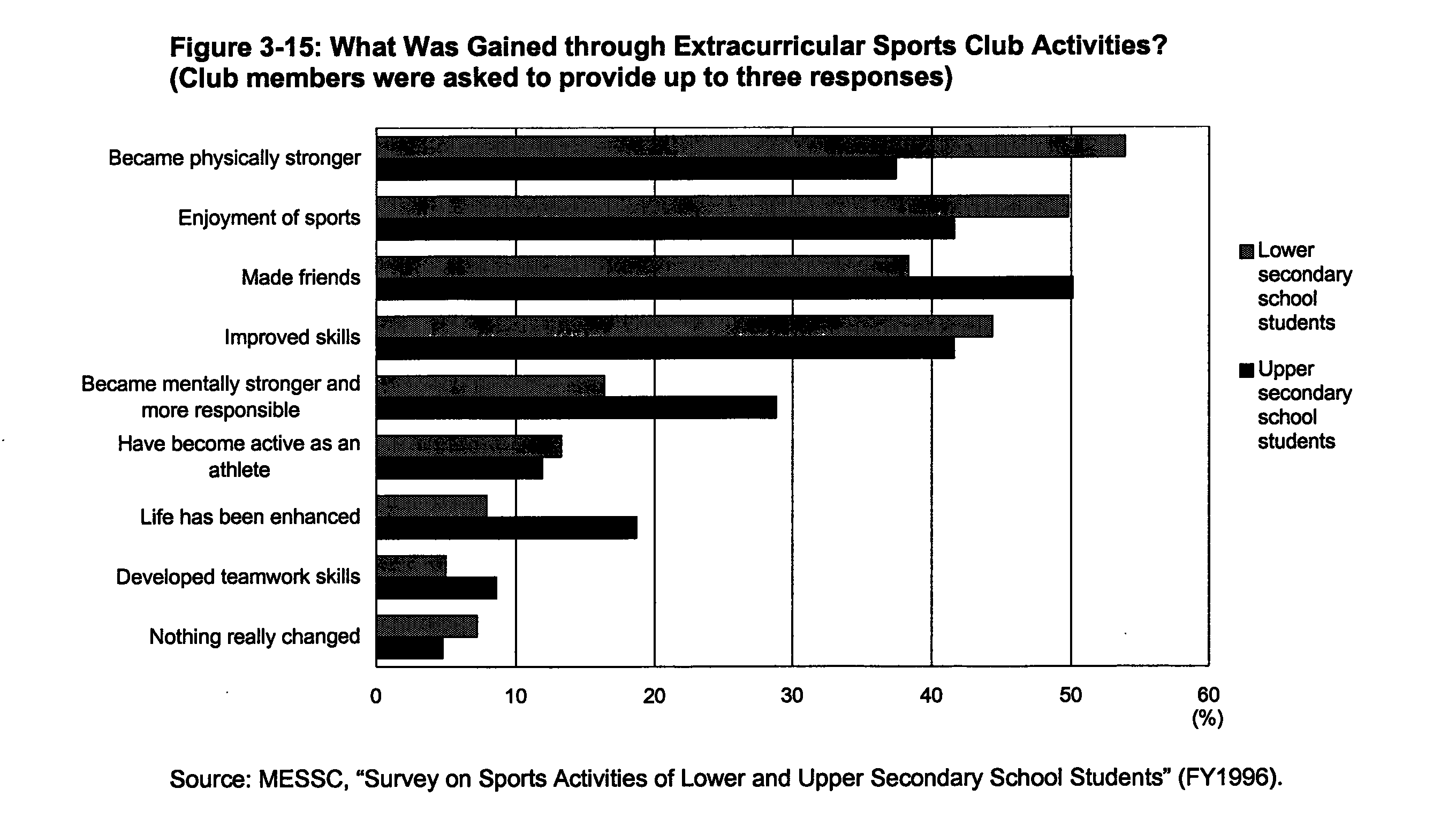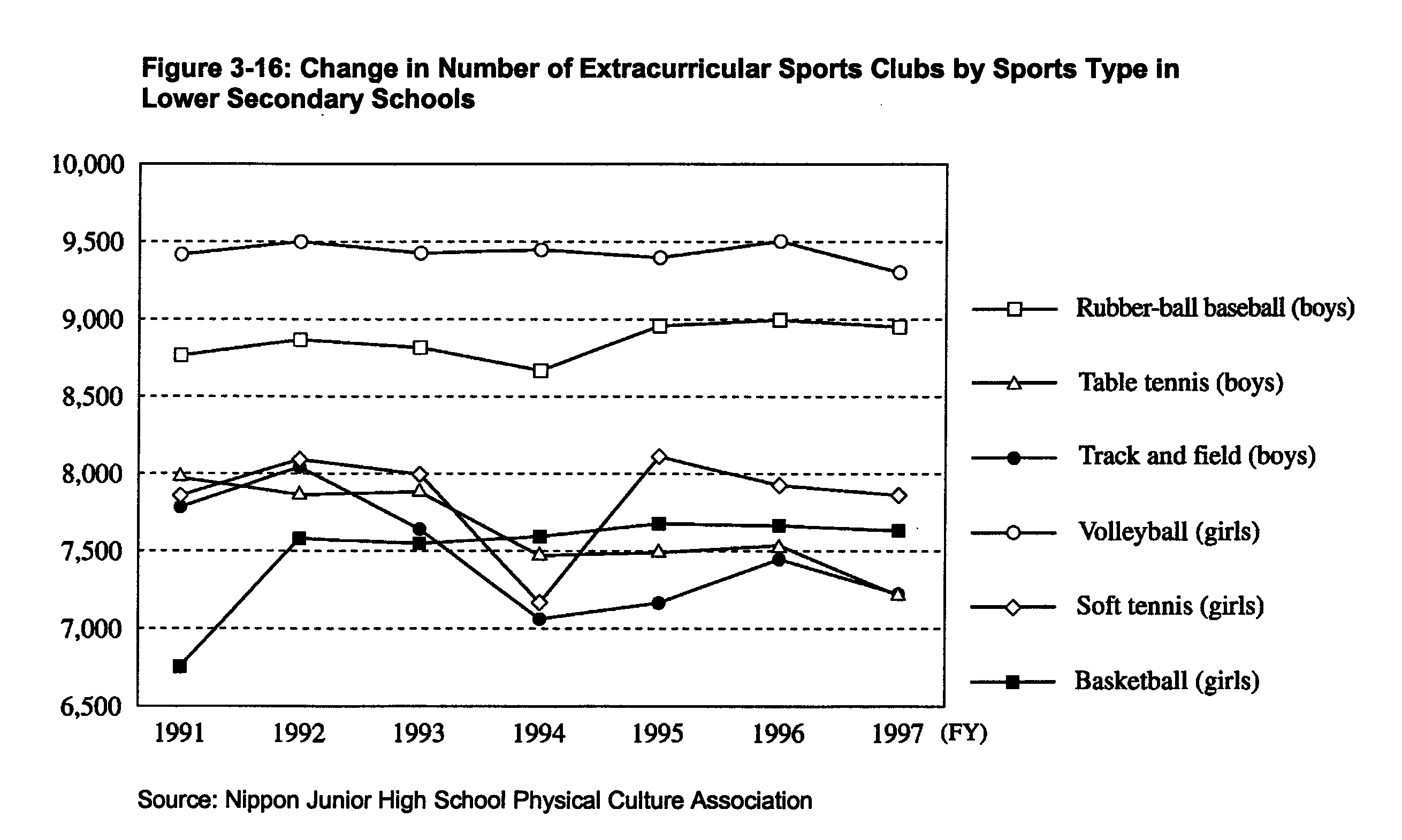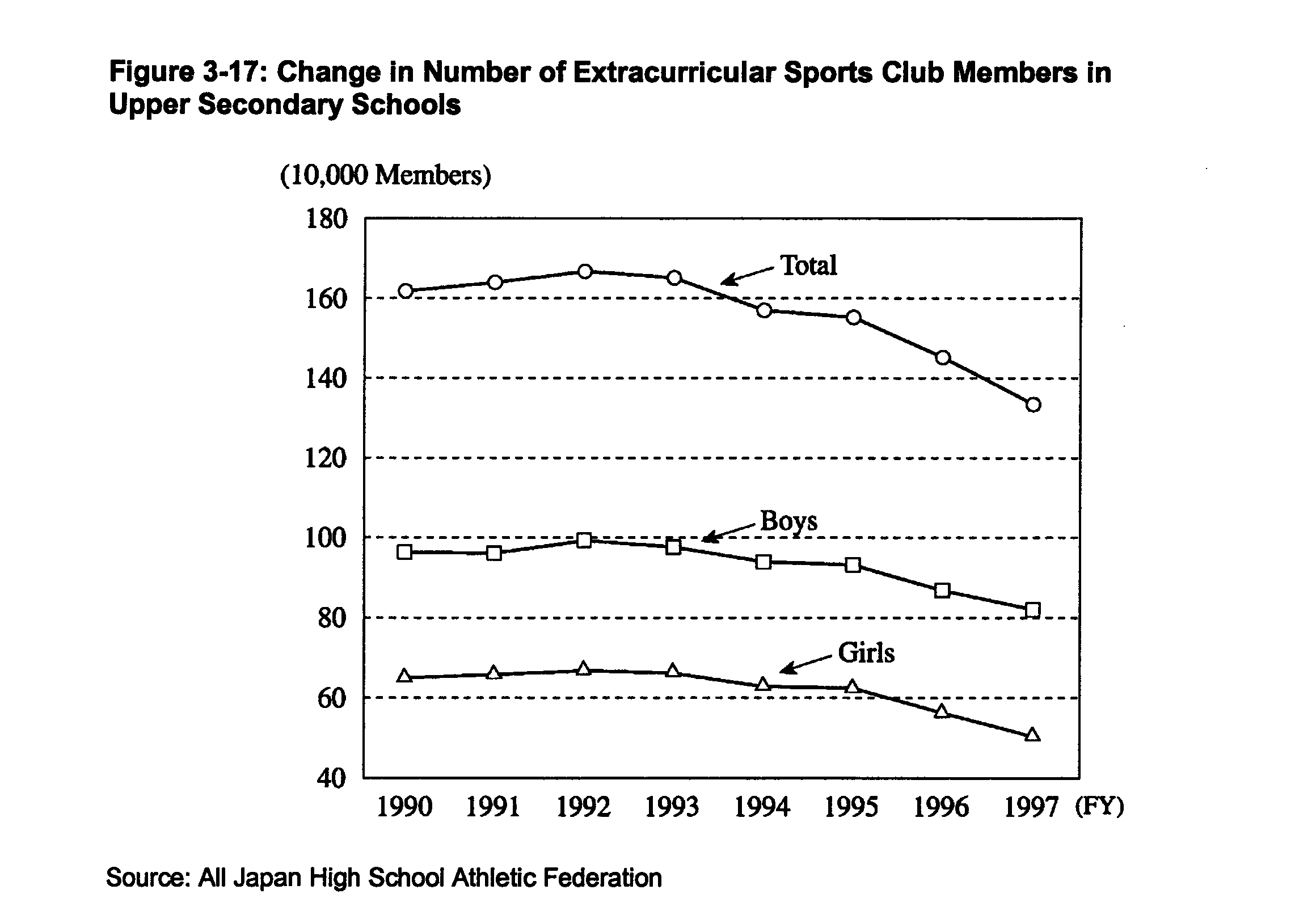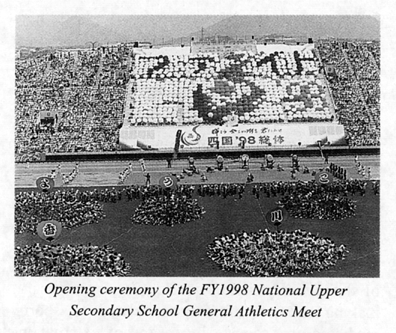| Home > Policy > White Paper, Notice, Announcement > White Paper > JAPANESE GOVERNMENT POLICIESIN EDUCATION, SCIENCE, SPORTSAND CULTURE1998 > MENTAL AND PHYSICAL HEALTH AND SPORTS CHAPTER3 SECTION2 3 | ||
Extracurricular sports club activities form a part of school educational activities,providing an opportunity for students who share the same interest in sports to voluntarily and independently take part in those sports under the instruction of teachers or other supervisors.They are important because as students strive to attain a higher level of skill and challenge records,they also experience the fun and joy of sports as well as a richer school life.Extracurricular sports club activities enable students to become more deeply involved in the types of sports they have become interested in through their physical education classes,and to develop and enhance the skills they have acquired in class.At tbe same time,they can return to class with the skills they acquire in club activities and share them with other students.By providing an opportunity for students to voluntarily take part in the activities they have an interest in,extracurricular sports club activities also have the effect of fostering the capabilities and attitude to life-long participation in sports,while improving stamina and increasing good health,thereby complementing physical education class.By providing an opportunity for students to organize and carry out activities away from their classmates and others in the same grade,extracurricular sports club activities are also significant in that they develop initiative,teamwork,a sense of responsibility and a sense of solidarity,while giving students a chance to closely interact with their companions and teachers(advisors).In this way,extracurricular sports club activities support the sports activities and character building of students.The effective management of these activities further ensures that students lead cheerful school lives,while building trust in schools and nurturing an identity with schools among students and their parents and guardians.
In the"Survey on Sports Activities of Lowerand Upper Secorfdary School Students"conducted by MESSC in1996,over90%of students,parents and guardians and teachers respectively,said that extracurricular sports club activitieswould help the students in the future.In addition,80-90%of the students who belong to clubs saidtheir club activities were enjoyable;the sameshare of their parents and guardians said theywere satisfied with tbeir children's club activities( see Figure3-15 ).

Management in the Future Given the significance and current state of extracurricular sports club activities and recent changes in society,MESSC's Consultative Committee on Sports Activities of Lower and Upper Secondary School Students outlined issues related to the management of club activities in the future in the"Research Report on the Modalities for Extracurricular Sports Club Activities"compiled in December1997.
With the recent decline in the number of students,some schools have become unable to support extracurricular sports clubs.This trend is expected to increase in the future.In some cases,several schools bave combined activities andmany are calling for the authorization of participation of multi-school teams in inter-schoolsports events,such as ball sports.In NationalUpper Secondary School General Athletic Meetsand other major events,teams composed of morethan one school which were to be merged orabolished have already been allowed to participate in certain sports events.Studies are beingcarried out by those concerned toward thebroader application of this approach( see Figures3-16 , 3-17 ).
The foundation for lifelong participation in sports is cultivated in childhood,so it is important to ensure various opportunities for sports activity during this period.Bearing this in mind,there is a need for each school to consider the different orientation of individual students(e.g.,the increase in promoting health,exchange with friends,improvement of competitive strength)and to diversify activities(e.g.,season system,multiple activity system).


Club activities,as students'voluntary activities,should be conducted in a way that does not hinder the balanced lives and growth of students.Important points to this end include:(1)respecting the individuality of students,flexibly managing activities and not forcing students to participate against their will;(2)scheduling club off-days and training hours in line with the aims of the five-day school week;(3)As necessary,making use of information related to sports,medicine and science by means of external instructors and associations.
Examples of Extracurricular Sports Club Scheduling of Off-days,etc.In the"Research Report on the Modalities for Sports Club Activities |
Sports clubs in schools should form partnerships with community sports according to the specific circumstances of the community and school,as a means of complementing and enhancing those activities with a view to meeting the various sports needs of students and to deepening the exchange between students and local residents.For example,outstanding members of the community could be used as extemal instructors,or cooperation and exchange could be promoted with comprehensive community sports clubs and public/private sports facilities.

While school holidays increase with the full implementation of the comprehensive five-day school week system and the numbers of club ad-visors and club members decrease(recent trend),there is a need to take special measures to build the foundation for lifelong development through sports.Under these circumstances,there is a need for schools to ask communities to make those sports activities available to students with a keen interest in them,in mutual cooperation between schools and communities.This may be especially effective in,for example,.cases where certain club activities are not possible at a school because there are no appropriate instructors at that school,but an active program is available at the community level.Extracurricular sports club activities also provide an opportunity for exchange with students from other schools through competitions and other events with those schools.School athletic meets conducted as part of school educational activities not only serve as a goal for daily club practices,but are also significant as an opportunity for broader exchange among students through their participation in the competitions and management of the events.There are some clubs whose members are forced to practice excessively with the sole aim of victory in competitions.Efforts are being made to remedy these situations.What is most important is that instructors,schools and parents and guardians deepen their understanding about the mental and physical growth of children to ensure such over-practicing does not occur.
| Back to Top | MEXT HOME |